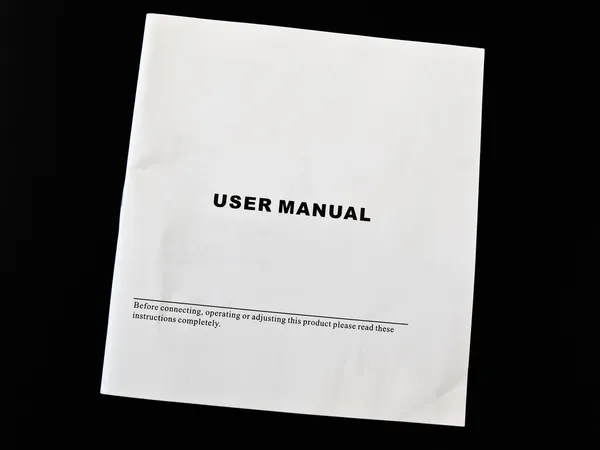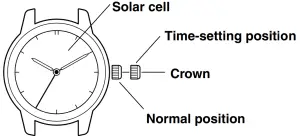CITIZEN Watch Instruction Manual
BEFORE USING
This watch is not powered by a conventional battery, but is powered by converting light to electrical energy.
Before using, be sure to fully charge your watch by exposing it to light. (See “F. Time required for charging”, for charge time reference).
Once fully charged, the watch will continue to run for approximately 6 months without additional charging. We do recommend exposing your watch to light every day to ensure optimum performance. Always be sure to recharge the watch before it stops.
Your watch features an Overcharge Prevention Function so there is no need to worry about overcharging your watch.
A special rechargeable cell is used to store electrical energy. This special cell does not require periodical replacement and is a clean energy unit that does not use any toxic substances.
SETTING THE TIME AND CALENDAR
Three-hand models without calendar display;If your watch has a screw-type crown, lift up the crown to loosen it before operation. Be sure to press the crown down firmly after operation.
Setting the time
- Stop the second hand by pulling out the crown.
- Turn the crown to set the time.
- After setting the time, firmly push the crown back into its normal position.

Models with calendar (date and weekday) display
If your watch has a screw-type crown, rotate the crown counter clockwise until it releases from the case. After operation, push the crown in to the case. With gentle pressure towards the case, rotate the crown clockwise to secure it to the case. Be sure to tighten firmly
Setting the time
- Stop the second hand by pulling the crown out to the 2nd click (time setting position).
- Turn the crown to set the time.
- The watch will start after the crown is firmly pushed back into its normal position.
Setting the calendar
- Pull the crown out to the 1st click (calendar setting position).
- Set the desired date by turning the crown counterclockwise.
- Set the desired day of the week by turning the crown clockwise.
- In the case of date display models, turning the crown clockwise will result in the loose play of the crown.
- After you have set the calendar, be sure to press the crown back to its normal position.
- Do not adjust the calendar when the watch is reading as below. Otherwise the calendar may not change correctly.
- Date display models ….. between 9:00 pm and 1:00 am
- Date, day of the week display models ….. between 9:00 pm and 4:00 am
FUNCTIONS OF ECO-DRIVE WATCH
If the charge becomes insufficient, a warning function will operate and the display changes, as below.
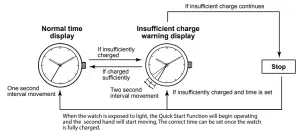
Insufficient Charge Warning Function
The second hand changes to a two second interval movement to indicate insufficient recharging. Even in such a case, the watch keeps correct time, but about 4 days after the two second interval movement begins, the watch will stop.After exposing the watch to light, recharging takes place and the watch returns to one second interval movement.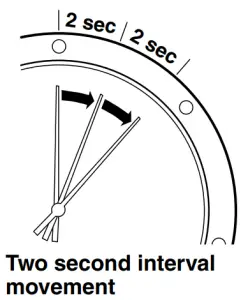
Quick Start Function
The watch will stop if it is completely discharged. It will begin to operate soon after it is exposed to light. (However, the time to start may vary according to the brightness of the light.)
Overcharge Prevention Function
You can recharge your watch without worryOnce the special rechargeable cell is fully charged, the overcharge prevention function comes into operation and prevents over-charging of the rechargeable cell.
CARE AND HANDLING DURING CHARGING
Notes on Use
To maintain optimal performance, be sure to expose your watch to light regularly.Please note that if you wear long sleeves, your watch may be hidden from light and may result in insufficient charging. As such, additional exposure to light may be necessary.When you take your watch off, be sure to place it in as bright an area as possible.
Notes on recharging
Avoid recharging your watch in areas of high temperatures (over about 60 °C / 140 °F), otherwise the sensitive components of the watch may become damaged. (e.g.) Incandescent lights generate heat sufficient to damage your watch. Be sure to keep the watch at least 50cm (20inches) away from the bulb so no damage occurs. We do not recommend the use of Halogen bulbs for recharging.
Never place your watch on the dashboard or rear deck of a vehicle as the heat generated in these areas can damage your watch.
ABOUT THE RECHARGEABLE CELL
Unlike ordinary watches, the special rechargeable cell used in your watch does not need regular replacement. This is a clean energy cell that will last the life of the watch.
CAUTION:
The energy cell should last the life of the watch. Never allow anyone other than an Authorized Service Center to replace this cell. The movement is designed to operate with only the original rechargeable cell. If an alternate cell is installed, such as a conventional battery, the battery may become overcharged resulting in damage to the movement and/or bursting of the cell, which could cause injury to the user.
TIME REQUIRED FOR CHARGING
Below are the approximate times required for charging when exposing the watch dial to light continuously. This table is for general reference only and does not represent exact charging times.
| Environment |
Illuminance (lx) |
Charging time (approx.) | ||
| To work for one day | To start working normally when the cell is discharged | To become fully charged when the cell is discharged | ||
| Outdoors (sunny) | 100,000 | 2 minutes | 17 minutes | 11 hours |
| Outdoors (cloudy) | 10,000 | 11 minutes | 2 hours | 35 hours |
| 20 cm (7-7/8 inches) from a fluorescent lamp (30W) | 3,000 | 40 minutes | 7 hours | 120 hours |
| Interior lighting | 500 | 4 hours | 50 hours | —— |
The recharging time is the time the watch is continuously exposed to direct light. To become fully charged when the cell is discharged…Time required to fully charge when the watch has completely stopped.To work for one day…Time required to charge the watch sufficient for one-day use with one second interval operation.
CAUTION:
When recharging the watch after it is completely in the stop state, be sure to pull out the crown to the time setting position.After recharging, set the time and push the crown firmly back into its normal position.
IN THESE CASES
[If the watch warns that the energy is running short]The second hand starts moving at two second intervals in order to warn that the watch will stop functioning after about 1 week. (Insufficient Charge Warning Function) In such a case, expose your watch to light for a while to cancel the warning. (The second hand returns to moving at one second intervals when the energy is recharged.) If the watch is left short of energy, it will stop functioning after 4 days or so.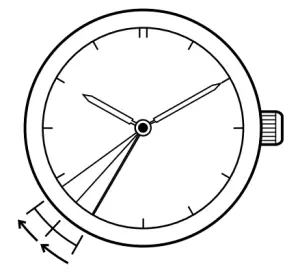 Two second interval movement
Two second interval movement
[If the watch warns you to set the time.]When the watch that has stopped is exposed to light, the second hand starts two second interval movement (Quick Start Function). The time elapsed before the second hand starts moving depends on the illuminance of the light. Even so, the second hand continues the two second interval movement to tell you that the watch indicates an incorrect time because it had stopped.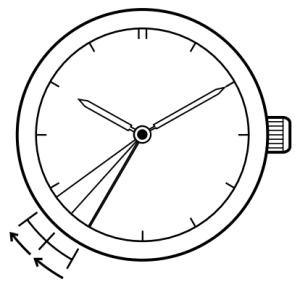 Two second interval movement
Two second interval movement
In such a case, set the hands to the correct time.If the watch is insufficiently exposed to light, the second hand will soon switch to moving at two second intervals in order to warn that the energy is running short.
DO NOT USING THIS WATCH WHILE DIVING WHEN…
PROHIBITED
Do not use your watch while diving when the following occur
- The insufficient recharging warning feature is activated. As the battery approaches the end of its life, the second hand begins to move in 2 second increments. (When this happens, expose the watch to light so that it recharges and the second hand returns to normal movement. )
- The watch stops or exhibits any abnormal operation.
WHEN USING FOR DIVING
Precautions when Using during Diving:
- When using a diver’s watch, please make sure that you have received the proper education and training for various types of diving, and observe all rules.
- Please make sure to use the watch properly based on a thorough understanding of watch handling and precautions. Please note that failure to operate the watch in a manner not described in the user’s manual may prevent the watch from functioning properly.
Before Diving
- Please make sure that the crown is pushed in firmly and the screw is securely tightened.
- Please check that the band is securely attached to the watch.
- Please confirm that there are no cracks, scratches, chips or other abnormalities in the band and glass.
- Please check that the rotating bezel rotates properly.
- Please check that the time and date are set correctly.
- Please check that the second hand is moving properly. If the second hand is moving at two-second intervals, this means that the watch is not sufficiently charged. Sufficiently charge the watch when this occurs.
During Diving
- Never attempt to turn or pull out the crown underwater. This can cause defective water resistance or other malfunction.
- Be careful to avoid bumping your watch on hard objects such as diving equipment or rocks.
After Diving
- Completely wash off any sea water, mud or sand adhered to the watch with pure water after checking that the crown and screw are tightened. Wipe off any excess moisture with a dry cloth.
USING THE ROTATING BEZEL
The rotating bezel can be used as a reference for elapsed time during diving or for the amount of time remaining relative to a predetermined amount of time.
[Setting the Rotating Bezel]
Only turn the rotating bezel to the left. It cannot be rotated in the opposite direction (to the right) to prevent the risk of incorrect operation.Determination of Elapsed TimeTurning direction Elapsed time
Elapsed time
Align the ▼ mark on the rotating bezel with the minute hand. After a certain amount of time has elapsed, the elapsed time can be determined from the scale on the rotating bezel.
Determination of Remaining Time
The remaining time can be determined by aligning the ▼ mark on the rotating bezel with the target time.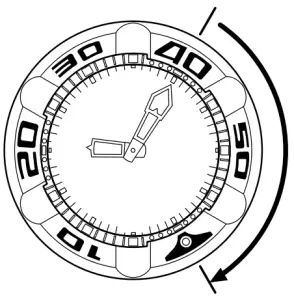 Remaining time
Remaining time
PRECAUTIONS
CAUTION:
Water-resistance performanceThere are several types of water-resistant watches, as shown in the following table.The unit “bar” is roughly equal to 1 atmosphere. * WATER RESIST(ANT) xx bar may also be indicated as W.R. xx bar.
|
Indication |
Specifications |
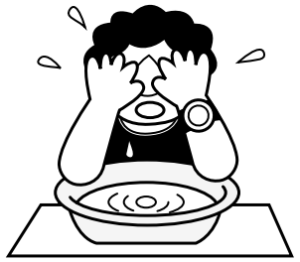 Minor exposureto water (washing face, rain, etc.) Minor exposureto water (washing face, rain, etc.) |
|
Dial or Case (case back) |
||
| AIR DIVER’S 200M | Water-resistant to 200M |
OK |
| AIR DIVER’S 300M | Water-resistant to 300M |
OK |
For correct use within the design limits of the watch, confirm the level of water resistance of your watch, as indicated on the dial and case, and consult the table.
|
Examples of use |
||||
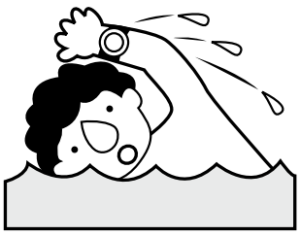 Moderate exposure to water (washing, kitchen work, swimming, etc.) Moderate exposure to water (washing, kitchen work, swimming, etc.) |

Marine sports (skin diving) |

Scuba diving (with air tank) |

Saturation diving (helium enriched environment) |

Operation of the crown with moisture visible |
|
OK |
OK | OK | OK | OK |
| OK | OK | OK | OK |
OK |
CAUTION
- Be sure to use the watch with the crown pressed in (normal position). If your watch has a screw-type crown, be sure to tighten the crown completely.
- Do NOT operate the crown with wet fingers or when the watch is wet. Water may enter the watch and compromise water-resistance.
- If the watch is used in seawater, rinse with fresh water afterward and wipe with a dry cloth.
- If moisture has entered the watch, or if the inside of the crystal is fogged up and does not become clear within a day, immediately take the watch to your dealer or Citizen Service Center for repair. Leaving the watch in such a state will allow corrosion to form inside.
- If seawater enters the watch, place the watch in a box or plastic bag and immediately take it in for repair. Otherwise, pressure inside the watch will increase, and parts (crystal, crown, buttons, etc.) may come off.
CAUTION: Keep your watch clean.
- Leaving dust and dirt deposited between the case and crown may result in difficulty in pulling the crown out. Rotate the crown while in its normal position, from time to time, to loosen dust and dirt and then brush it off.
- Dust and dirt tend to be deposited in gaps in the back of the case or band. Deposited dust and dirt may cause corrosion and soil your clothing. Clean the watch occasionally.
Cleaning the Watch
- Use a soft cloth to wipe off dirt, perspiration and water from the case and crystal.
- Use a soft, dry cloth to wipe off perspiration and dirt from the leather band.
- To clean a metal, plastic, or rubber watchband, wash away dirt with mild soap and water. Use a soft brush to remove dust and dirt jammed in the gaps in the metal band. If your watch is not water-resistant, take it to your dealer.NOTE: Avoid using solvents (thinner, benzine, etc.), as they may mar the finish.
CAUTION: Operating environment
- Use the watch within the operating-temperature range specified in the instruction manual. Using the watch where temperatures are outside the specified range, may result in deterioration of functions or even stoppage of the watch.
- Do NOT use the watch in places where it is exposed to high temperature, such as in a sauna. Doing so may result in a skin burn.
- Do NOT leave the watch in a place where it is exposed to high temperature, such as the glove compartment or dash-board of a car. Doing so may result in deterioration of the watch, such as deformation of plastic parts.
- Do NOT place the watch close to a magnet. Timekeeping will become inaccurate if you place the watch close to magnetic health equipment such as a magnetic necklace or a magnetic latch of a refrigerator door or handbag clasp or the earphone of a mobile phone. If this has occurred, move the watch away from the magnet and reset the time.
- Do NOT place the watch close to household appliances that generate static electricity. Timekeeping may become inaccurate if the watch is exposed to strong static electricity, such as is emitted from a TV screen.
- Do NOT subject the watch to a strong shock such as dropping it onto a hard floor.
- Avoid using the watch in an environment where it may be exposed to chemicals or corrosive gases. If solvents, such as thinner and benzine, or substances containing such solvents come in contact with the watch, discoloration, melting, cracking, etc. may result. If the watch comes in contact with mercury used in thermometers, the case, band or other parts may become discolored.
Periodical inspections
Your watch needs inspection once in every two or three years for safety and long use. To keep your watch water-resistant, the packing needs to be replaced regularly. Other parts need to be inspected and replaced if necessary. Ask for Citizen geuine parts upon replacement.
SPECIFICATIONS
- Caliber No.:E16 ※
- Type:Analog Quartz Watch with 3 Hands
- Accuracy:Within ±15sec/month (within a normal temperature range of 5˚C/41˚F to 35˚C/95˚F)
- Quartz oscillator frequency:32,768Hz
- IC:C/MOS-LSI (1 pc.)
- Operational temperature range:-10˚C/14˚F to +60˚C/140˚F
- Display features:Time: hour, minute, second Date: date (models with date display)
- Additional features:Insufficient charge warning, Quick start, Overcharge prevention
- Continuous operating time:Approx. 6 months (from full recharge to stop) Approx. 4 days (from two second interval movement to stop)
- Battery:Rechargeable cell (lithium button cell),1pcSpecifications are subject to change without prior notice.

[xyz-ips snippet=”download-snippet”]

